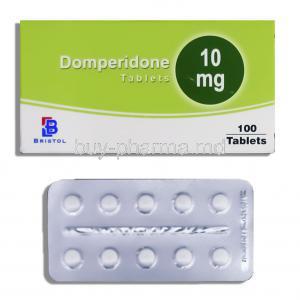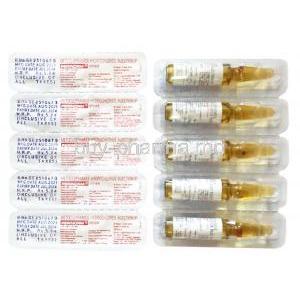Introduction to Parit (Rabeprazole)
Parit, commonly known by its active ingredient rabeprazole, is classified as a Proton Pump Inhibitor (PPI). As a medication, it primarily functions by inhibiting the enzyme responsible for acid production in the stomach, effectively managing conditions associated with excess stomach acid. Parit is widely used in the treatment of acid-related disorders and offers a robust approach to maintaining digestive health by reducing gastric acid output.
With its ability to provide relief from conditions like acid reflux, ulcers, and esophagitis, Parit has become essential in gastroenterology. The benefit of PPIs like Parit extends beyond mere symptom relief, aiding in the prevention of complications related to acid-induced mucosal damage.
Uses of Parit (Rabeprazole)
Primary Uses of Parit
Parit is primarily prescribed for various acid-related conditions:
- Gastroesophageal Reflux Disease (GERD): Parit helps in managing GERD by reducing stomach acid, alleviating heartburn and regurgitation.
- Peptic and Duodenal Ulcers: Effective in healing ulcers in the stomach and the upper part of the small intestine.
- Erosive Esophagitis: Reduces inflammation and prevents erosion caused by stomach acid.
- Heartburn Relief: Provides symptomatic relief from frequent acid-related heartburn episodes.
Off-Label Uses of Parit
Beyond its primary applications, Parit is also used off-label in certain conditions:
- Helicobacter pylori Eradication: Often prescribed with antibiotics to treat Helicobacter pylori infections, reducing acid to aid bacterial eradication.
- Zollinger-Ellison Syndrome: Used in managing excessive gastric acid production in patients with this rare condition.
- Hypersecretory Conditions: Sometimes applied in conditions with abnormally high gastric acid secretion.
How Parit (Rabeprazole) Works
Parit operates through the inhibition of the H+/K+ ATPase enzyme, colloquially known as the "proton pump," in the stomach lining. This enzyme is crucial for the production of hydrochloric acid. By halting the final step in acid secretion, Parit dramatically lowers gastric acidity.
The onset of action is rapid, with peak acid suppression occurring within hours, providing relief that can last up to 24 hours. Its long-lasting effect makes it a preferred choice for daily acid control.
Composition of Parit (Rabeprazole)
Parit comprises rabeprazole as its active ingredient, alongside several inactive ingredients to aid in tablet formation and stability:
- Active Ingredient: Rabeprazole sodium
- Inactive Ingredients: Include magnesium oxide, mannitol, and other stabilizers that help with absorption and effectiveness.
Parit is commonly available in tablet form, though some markets offer it in capsules, depending on individual patient needs.
Dosage and Administration of Parit (Rabeprazole)
Standard Dosage Guidelines
Parit is typically prescribed as follows:
- GERD and Ulcers: One tablet, once daily, usually taken before a meal.
- Erosive Esophagitis: Higher doses may be recommended for severe cases.
Special Dosage Considerations
- Patients with Kidney or Liver Impairment: Dosing may require adjustment based on individual health assessments.
- Elderly Patients: Due to age-related metabolic changes, doctors may prescribe lower doses.
Missed Dose and Overdose Instructions
If a dose is missed, it should be taken as soon as possible unless it is close to the next scheduled dose. In cases of overdose, medical attention should be sought immediately to address potential symptoms of excessive acid suppression.
Side Effects of Parit (Rabeprazole)
Common Side Effects
Some common side effects include:
- Headache
- Nausea
- Diarrhea
These effects occur as the body adjusts to acid reduction and typically subside over time.
Serious Side Effects and Risks
- Vitamin B12 Deficiency: Long-term use can reduce absorption of vitamin B12.
- Bone Fractures: High doses over extended periods have been linked to bone density reduction.
If any serious symptoms occur, immediate medical attention is advised.
Warnings and Precautions for Parit (Rabeprazole)
General Precautions
Strict adherence to the prescribed dosage and treatment duration is essential to avoid complications. Prolonged use of PPIs like Parit can lead to dependence and other long-term risks.
Important Precautions
- Calcium and Magnesium Levels: Long-term use may deplete calcium and magnesium stores, requiring supplementation.
- Infection Risk: Reduced stomach acid may increase susceptibility to gastrointestinal infections.
Contraindications
- Allergies: Those with a known allergy to rabeprazole or other PPIs should avoid Parit.
- Exacerbating Conditions: Parit may worsen symptoms in specific gastrointestinal disorders; a doctor should be consulted before use.
Administration in Special Populations
Administration to Elderly Patients
In elderly patients, Parit administration necessitates specific dosage adjustments to account for age-related physiological changes. With slowed metabolism and potential co-morbidities, older adults may require reduced dosages or increased monitoring for adverse effects. Regular assessments are recommended to ensure optimal therapeutic benefits while minimizing the risk of side effects or drug interactions common in this age group.
Additional risks for elderly patients include an increased likelihood of fractures and potential vitamin B12 deficiency over prolonged use, as PPIs can affect calcium and nutrient absorption. Close monitoring can help mitigate these risks, while supplemental calcium or vitamin B12 may be recommended as a preventive measure.
Administration to Pregnant Women and Nursing Mothers
Rabeprazole, the active ingredient in Parit, has limited data on its safety profile during pregnancy. Although animal studies show no direct teratogenic effects, the lack of extensive human studies suggests caution. Parit should only be administered to pregnant women if the potential benefits clearly outweigh potential risks, and under direct medical supervision.
For breastfeeding mothers, it is recommended to consider alternative treatments or monitor infants for adverse reactions if Parit use is unavoidable. Healthcare professionals may suggest a risk-benefit analysis to ensure both maternal and infant safety.
Administration to Children
Parit has specific approvals for pediatric use in conditions such as GERD, with tailored dosages for younger patients. Pediatric administration requires cautious dosing and frequent follow-up to monitor response and adjust treatment as necessary. Off-label use in children for conditions beyond the approved scope should only occur under specialized pediatric supervision, as the effects of prolonged acid suppression in growing bodies are not fully understood.
Drug Interactions with Parit (Rabeprazole)
Potential Drug Interactions
Rabeprazole can interact with various medications, influencing its efficacy or the effectiveness of co-administered drugs:
- Anticoagulants: Rabeprazole may impact blood-thinning medications, potentially altering their effect and necessitating adjusted dosages.
- Antifungals: Medications like ketoconazole may require the presence of stomach acid for absorption, leading to reduced efficacy when taken with Parit.
These interactions primarily occur due to changes in gastric pH levels, which can affect the absorption and metabolism of other drugs, sometimes requiring alternative treatments or adjustments.
Food and Lifestyle Interactions
Dietary and lifestyle factors can influence the effectiveness of Parit:
- Alcohol: Excessive alcohol consumption can exacerbate acid production, potentially diminishing the effects of Parit.
- Smoking: Smoking has been shown to irritate the stomach lining, counteracting the acid-suppressing benefits of Parit and increasing the risk of complications.
- Specific Foods: Spicy and acidic foods may cause discomfort even with acid suppression, so a balanced diet is recommended.
Careful Administration and Important Considerations
Careful monitoring while on Parit therapy is crucial to ensure patient safety and treatment efficacy. Patients with conditions like osteoporosis, where calcium absorption is essential, or liver impairment, which affects drug metabolism, may require adjusted dosages or alternative therapies.
Healthcare providers recommend regular follow-ups for patients on long-term Parit therapy to evaluate for side effects, check nutrient levels, and adjust therapy as needed. Routine consultations can prevent complications and ensure the medication remains effective over time.
Storage and Handling Precautions for Parit (Rabeprazole)
Storage Instructions
To maintain the potency of Parit, it should be stored under controlled conditions. An ambient temperature below 25°C (77°F) is ideal, away from moisture and direct sunlight. Exposure to extreme temperatures or humidity can reduce the efficacy of the medication.
Parit has a shelf life indicated on its packaging, beyond which its therapeutic effects may diminish. Patients are encouraged to check expiration dates before use and to discard outdated medication.
Handling Precautions
For safe handling, tablets or capsules should be kept in their original packaging until use, protecting them from environmental factors. When disposing of unused or expired Parit, follow local disposal regulations or consult a pharmacist to avoid environmental contamination.
Signs and Management of Overdosage
Symptoms Indicative of Parit Overdose
Symptoms of a Parit overdose may include:
- Dizziness
- Confusion
- Blurred vision
- Nausea and vomiting
These symptoms result from excessive acid suppression, leading to metabolic imbalances.
Immediate Steps to Take in Case of Overdose
If an overdose is suspected, it is crucial to seek immediate medical attention. Patients should not attempt to self-treat and should avoid additional medications until medical advice is received.
Recommended Medical Interventions and Treatments
Treatment for a Parit overdose may involve activated charcoal to limit absorption or supportive care to manage symptoms. Intravenous fluids and electrolyte monitoring may also be necessary to address metabolic imbalances caused by prolonged acid suppression. Healthcare providers may advise close monitoring to ensure complete recovery and prevent complications.






















